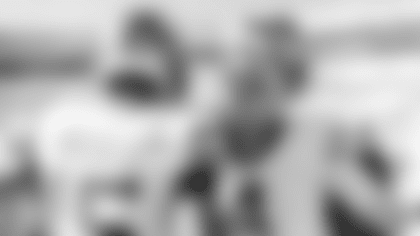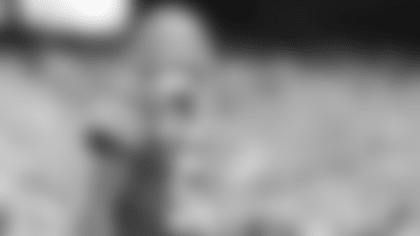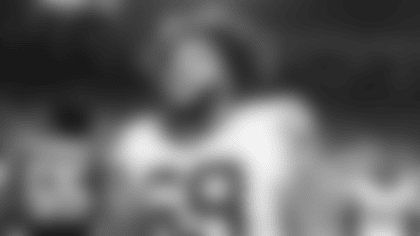The origin of the five-second rule was revealed Friday by Jets head coach Eric Mangini. Dan O' Brien, who was considered one of the world's greatest athletes in the 1990s, visited the team earlier this year. The former decathlete captured a number of world championships and took home the gold in the 1996 Summer Olympics.
"He talked about the way he would mentally prepare event-to-event," Mangini said of O'Brien and his grueling participation in 10 events over two days. "He may win an event by a significant margin, but if he celebrated too long - he was dead in the next one."
Read below for Mangini's complete press conference transcript
New York Jets' Head Coach Eric Mangini, 12.15
Opening Statement…
We've had two really good days of practice. Obviously there are always things on Wednesday and Thursday we have to clean up, being the first days of installation in the various areas. Overall, there was good execution, good focus, good technique, and that's important because you play like you practice. I talked to the players this morning about the importance of continuing to build on these first two days and finish the week off strong.
Today will be a typical Friday for us. We'll work in the red zone, goal line, two-minute and those key areas which always play an important role in every game.
On any motivational film Mangini will show regarding playing in a dome…
There are a couple games I looked at. I didn't decide to show it. We had some other things that we went through. However, we've worked in the bubble this week. That is our dome. The noise has been good inside of there. Like any other sort of new area that you're going to work in, it's something we're getting used to and adjusted to. The focus has been good. They've enjoyed the bubble work.
On Jonathan Vilma's impact…
When you look at Jon, two weeks ago he was the defensive player of the game. We're one game removed from that. Similar to Chad's (Pennington) performance, there are a lot of things that happened offensively where Chad's involved, helping to put us into good plays, get us out of bad plays. The same thing is true with Jonathan. He does so much, he isn't necessarily just tackling or blitzing that helps the whole defense operate effectively. Jon has been very good at that. That contribution has been extremely valuable.
On if Vilma will stay in his position…
We do everything based on what is best for the team. Jon has made significant improvement week-in and week-out. We talked about this three or four weeks ago where as you grow in a system, you find the way to play the system that best fits your skill set. It's a similar situation with Tedy Bruschi. He played that position to best fit the things he did well. Junior Seau, and right on down the line to Ted Johnson and Roman Phifer. There have been so many different styles of players that have played in the system and understand, as they grow in it, how to best use their strengths. Jon has made tremendous progress.
On the Vikings allowing defensive touchdowns…
You always want to protect the football. That's a key part of any game. I'm sure that they're working on that, just like we work on it. We obviously don't want to give up any offensive plays which turn into defensive scores.
The return game, special teams is something we put a heavy emphasis on. Mike Westhoff does an exceptional job, at that. Everybody here plays a part in special teams. Everybody is involved. Offensively and defensively, if you need a rest, you get the rest on offense or defense. We don't take you off of special teams. That's always a point of emphasis for us.
On teams abandoning the run against Minnesota…
As you look through the tape over the course of the season, there have been a lot of plays that have been successful. You look at those plays and you try to see what they did on that specific scheme to be successful, then you try to look at the things that you do well and tailor them and put them both together. You have to do both in a game. Each game that we go into is based on exploiting an opponent's weaknesses, taking away their strengths, and really playing to our strengths. Our game plan changes week-in and week-out.
On if the Jets will abandon the run…
You have to be able to incorporate both the run and the passing game. During the course of the game, sometimes you throw more and sometimes you run more. Sometimes it's just about the flow of the game. There will be a plan of attack going in, then you'll also gauge it as the game moves on as to where you want to put your emphasis.
On Wallace Wright…
When we originally brought him in for a try-out, he had all the characteristics we looked for in our draft picks and undrafted free agents. He carried those characteristics into the rookie try-outs. There wasn't going to be any inconsistency in the approach. When Wallace got here, we had our first meeting with all the rookies. I forget who told me this, maybe it was Otis Smith, he talked about how when he first got into the room, he knew that was the key step. He was in the room. Now he had the opportunity to show what he had to do. That was my message to those guys. You've gotten over one big hurdle. You're all in the room. You're all on the same footing. What you do from this moment on is going to determine whether you stay in the room. You control those things based on your performance and doing the things that we ask you to do.
Wallace was one of those guys that was a try-out, worked like crazy and got a contract. He went into training camp and was noticed there. Each day as you turn the film on, there are one or two plays where he became recognizable. He didn't allow us not to see him. Then he made the roster initially. We had to switch some things around, and he went back to the practice squad. He worked on offense, defense and special teams. Now opportunity has knocked for him again. He had the special teams tackle last week. I really like his consistency. He's the same guy every day. He's got a very good motor. I like his toughness. I like his willingness to play whatever position he can play to help us. All of those things have really played a part in his success.
On how players react to life in the NFL…
You definitely talk to the players as that process unfolds. But him being a young guy and being his first time through it's not easy. It's not like in high school when you get a college scholarship and you are there for four years. Okay, you've made the roster, but this is an ongoing, day-to-day process where you have to continually show that you can contribute to the team and that you can play a role.
On how Wright came on the Jets' radar…
The college scouting department and the pro personnel department work together with the group of try-out guys to bring in what they determine to be the best group.
On requests Mangini gets to look at players…
We do get quite a bit of mail every day. I get letters all the time from moms and dads, uncles and cousins. They reference the fact that I was a ball boy and someone had to give me an opportunity. They say their son works really hard and is a nice guy. I'd love to give everybody an opportunity. Unfortunately, you have to process through that and really try to shift the resources the best way that you can. But I do get quite a bit of mail.
On Chad Pennington's extra self study…
We have every one of our games broken down. It's broken down by all the statistical information, all the plays, all the situations. If Chad wanted to look at all of his third-down plays, he could log in, get to third downs. If he wanted to look at third-down passes, that wouldn't be a problem. If he wanted to look at third-down passes out of 11 personnel, he could sort it that way. Each criteria has a box. You can pick as many criteria as you want, sort it, get as specific as you want to. He has that ability. Then he has the evaluations week in and week out from Brian (Schottenheimer). That could be another resource. There's a lot of different ways that he can go through that.
On if Pennington has that information available to him at home…
A lot of guys will spend the money to have a unit, their own personal unit. There's some real value in that. It's pretty expensive. Most quarterbacks usually can swing that. I'm not sure if he has his own unit, but we definitely provide him with whatever he needs. If he needs to study at home, we take care of that. For all of our players, we try to make the study as easy as possible.
On Mangini and Pennington discussing this week's game plan…
We are going to deal with adversity every week. Adversity is going to take different forms. It could be a big play, it could be an injury, it could be a turnover. Whatever that is, that's just part of week-in and week-out in the NFL. The important thing is once the play is done, what did you learn from it? How did you grow as a player? How did you grow as a team? How are you going to react to it the following week? That's something that we talk about quite a bit: Turnovers are going to happen. So now when it happens, we implement the five-second rule, move on, go to the next play, focus on that. You can't control it. It's done. It's in the book. Just move on.
On where the five second rule came from…
That was Dan O'Brien (Olympic gold medalist), when he spoke to us, he talked about the way he would mentally prepare event-to-event. He may win an event by a significant margin, but if he celebrated too long, he was dead in the next one.
On players moving from team-to-team…
It's a tough part of the business where when you leave the team that drafts you, you're really fighting a different type of battle. The team that you go to has a group that they've drafted, a group that's been there, a group that the coaches have exposure to, and you have to really work that much harder to establish your position again. That happens with a lot of guys who transition and then have to sort of find another place where they fit.
Hank (Poteat) is a guy who has had a few travels. He just comes in and works as hard as he can when he gets the opportunity. I think that's the best approach. I would imagine Derrick (Strait) does that.
On the importance of developing quarterback-wide receiver chemistry early versus Minnesota…
We really work on developing the chemistry on the offense early, not just with the receivers but the running game as well as the blocking game. That's all very important. Any time you go into a game, you want to get off to a fast start. There were some weeks early where we didn't do that, and we were finishing well, then some weeks where we were starting fast and not finishing as well as we'd like to. What we're looking to do is have that balance of performance throughout the course of the game. We don't want to peak in the first quarter and then have a lull. You want to be more of a straight-line, consistent-performing team across the board.
Friday Injury Report Jets Questionable: FB B.J. Askew (foot), CB David Barrett (hip), LB Matt Chatham (foot), Eric Smith (foot) LB & Bryan Thomas (shoulder)
Probable: *RB Kevan Barlow (calf), *LB Brad Kassell (shin), *WR Justin McCareins (foot), *DL Rashad Moore (hand), *QB Chad Pennington (calf), *DL Dewayne Robertson (shoulder), *TE Sean Ryan (thigh) *WR Brad Smith (shoulder) *S Jamie Thompson (ankle) & *DL Kimo von Oelhoffen (shoulder)
Vikings Questionable: QB Brooks Bollinger (shoulder)
Probable: CB Cedric Griffin (neck), LB Napoleon Harris (wrist), WR Marcus Robinson (ankle), RB Chester Taylor (ribs), & DT Pat Williams (knee)
*Denotes players who participated in practice













